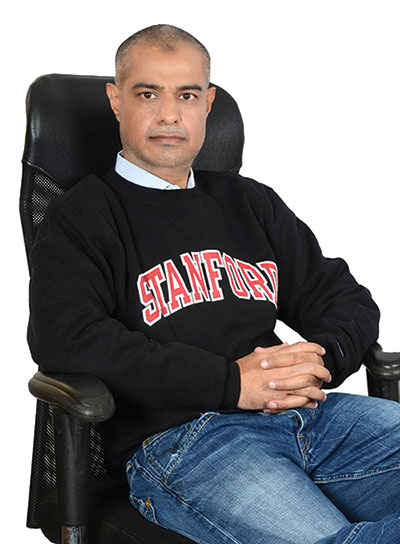“World’s lowest fee IB school”
Dilip Thakore interviewed Mansoor Durrani, vice president of the National Commercial Bank, Bahrain and promoter-chairman of the Eastern Public School, Bhopal (estb.2003) by telephone and email. Excerpts:
 The Eastern Public School (EPS), Bhopal has developed into Madhya Pradesh’s first wholly international school providing the PYP, MYP and IB diploma programmes of the Geneva-based International Baccalaureate and Cambridge International (UK) examination boards to 700 students of both sexes. Looking back, how satisfied are you with the growth and development of EPS?
The Eastern Public School (EPS), Bhopal has developed into Madhya Pradesh’s first wholly international school providing the PYP, MYP and IB diploma programmes of the Geneva-based International Baccalaureate and Cambridge International (UK) examination boards to 700 students of both sexes. Looking back, how satisfied are you with the growth and development of EPS?
I am fairly pleased with what we have accomplished during the past 15 years, bearing in mind that Bhopal is not a large metro like Mumbai or Delhi. Finding “international minded and globally experienced” teachers has been a never-ending challenge, particularly since we are an Islamic day school, and mainly attract local Muslim teachers and students.
Nevertheless, we have managed to gather a highly committed, locally sourced team of educators fully wedded to the EPS mission which is to produce eminent professionals, technocrats, scientists, entrepreneurs and researchers with strong ethical grounding. Our second batch of students who wrote the 2018 IB diploma class XII school-leaving exam averaged 33 points out of the maximum 45, and against the world average of 30. Some of our students have been awarded admission and scholarships by American, British and Malaysian universities. This outcome is very satisfying, especially if you consider the socio-economic backgrounds of our teachers and students.
As the school’s promoter, you have opted to affiliate EPS only with international examination boards. What’s the rationale?
My biggest advantage is that I am not a career educationist. I have been an Islamic corporate banker i.e, an interest-free banking practitioner, for 20 years. Therefore, I deeply researched pedagogies that would best serve the needs of 21st century children and came to the conclusion that the IB and Cambridge curriculums would be best for them.
The mission of EPS is to combine the “core values of Islam” with advanced IB and IGCSE academic syllabuses/curriculums. Aren’t these objectives contradictory? How satisfied are you that this combination has been successfully delivered to EPS students?
There’s absolutely no contradiction. In fact there is perfect synergy between IB philosophy and the core values of Islam — compassion, courage, deep thinking and reflection, communication and principled and open-minded conduct. Our students are obliged to complete a number of projects every year in which they invest IB philosophy and values. Therefore they imbibe these values as their religious obligation.
As indicated on your website, EPS has been almost entirely funded by you. What is the quantum of investment made in EPS thus far? To what extent do students’ fees cover annual operational and maintenance expenditure?
I am blessed and honoured to have completely funded this world-class school for the past 15 years. Thus far, I have donated tens of crores for construction of the world-class, purpose-built EPS campus and equipped it with state-of-the-art infrastructure and facilities. Moreover, from my monthly salary, I meet 30-40 percent of the operational expenses of the school with the rest being contributed by students’ fees ranging from Rs.3,000-6,000 per month. True, I live on a shoe-string budget, but I don’t regret it at all. It’s money well spent!
The IB examinations board is reputed to make affiliation conditional upon adherence to expensive infrastructure and teacher training norms. Was a concession granted to EPS?
Despite the IB board glorifying EPS as the world’s lowest fees levying IB school, we haven’t received any affiliation or teacher training fees concessions. As you point out, IB’s professional development programmes are very expensive. Therefore, I have invested heavily in the training and professional development of EPS teachers during the past 15 years.
What are the future growth and development plans drawn up for EPS?
The EPS philosophy is not to chase enrolments but to focus on delivering quality education. However, we need to hit a critical number so the school breaks even and becomes self-sustaining. That we have managed to keep the school running despite 15 years of deficit financing is a miracle, and I thank Allah for making this possible. But our enrolments are increasing steadily and hopefully within a year or two, EPS will be standing on its own feet. At that time, it can transform into a model school for replication.
Based upon your EPS experience, how optimistic are you about the future of Indian education?
India is a huge country, and our educational needs are massive. Sadly we are witnessing over-commercialisation of education — specially high quality international education. Therefore education in general and schooling in particular needs to be decommercialised. In my opinion, the entry of dedicated individuals/professionals — not necessarily with tons of money but tons of commitment — into K-12 education will make a huge difference to Indian education. EPS is open to sharing — free-of-charge — all our learnings and experiences accumulated through blood, sweat and tears over 15 years, with such education entrepreneurs.















Add comment